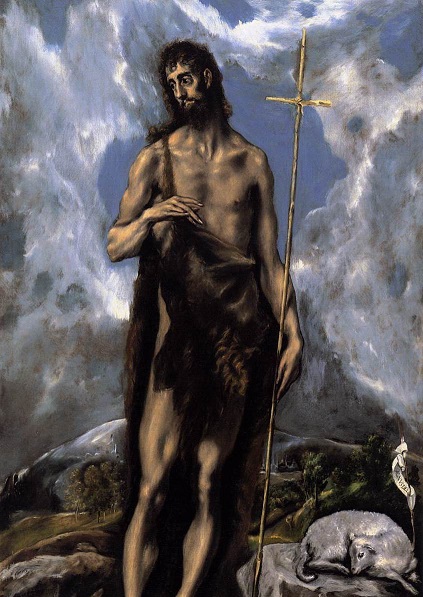Readings: Isaiah 40:1–11 | 1 Corinthians 4:1–5 | Matthew 11:2–11
Text: Matthew 11:2-11
John the Baptist (whose birth we have been hearing of during our midweek services) winds up in prison some time after Jesus began His ministry at the Jordan River. Yet, even while in prison, John still has his loyal disciples. No doubt they were part of the throng from “Jerusalem and all Judea” [Matt. 3:5] who came out to hear John’s preaching of repentance and received his baptism. Now that he was in prison, they were going to remain loyal to him and care for his needs, in spite of wicked King Herod. These loyal disciples were willing to suffer scorn and shame for John’s sake because they believed God was working through him and doing something mighty in their midst!

“2 Now when John heard in prison about the deeds of the Christ, he sent word by his disciples 3 and said to him, “Are you the one who is to come, or shall we look for another?” Some have wondered if this hints at some doubts that John is having, but John’s wrestlings aren’t really the point. John sends his disciples to Christ with a loaded question. It’s a question that John knows the answer to (as we will hear next Sunday from his testimony in John 1:19-28). “Are you the Coming One, or shall we look for another?” It’s the kind of question you ask when you want to want someone to really ponder the answer.
You see, John is not to meant to have disciples of his own once Christ comes. And for that matter, neither are Moses or Elijah [John 5:46-47]. John the Baptizer is doing what he has done for all of his ministry: pointing sinners to Christ.
But there is some rivalry at first, as we hear in John 3:26-30:
26 And they came to John and said to him, “Rabbi, he who was with you across the Jordan, to whom you bore witness—look, he is baptizing, and all are going to him.” 27 John answered, “A person cannot receive even one thing unless it is given him from heaven. 28 You yourselves bear me witness, that I said, ‘I am not the Christ, but I have been sent before him.’ 29 The one who has the bride is the bridegroom. The friend of the bridegroom, who stands and hears him, rejoices greatly at the bridegroom’s voice. Therefore this joy of mine is now complete. 30 He must increase, but I must decrease.”

So Jesus responds, not by saying, “I sure am!” but by pointing them to the signs: “Go and tell John what you hear and see: 5 the blind receive their sight and the lame walk, lepers are cleansed and the deaf hear, and the dead are raised up, and the poor have good news preached to them.” He lets the Scriptures and the evidence of their fulfillment speak for him. Isaiah 25:6-9; 29:18, 35:3-6, 40:9, 52:7, 61:1-3 proclaim in spades that Jesus is that promised Messiah, the Coming One who brings good news and comfort to sinners.
Here, there’s an important lesson: Do not judge God’s work merely by your own reasoning. John the Baptizer pointed to Jesus to be the Greater One, even the Lamb of God who takes away the sin of the world. But when people considered Jesus’ credentials, it didn’t add up. He wasn’t a Levite; He was a carpenter’s son. He lived in the nowhere town of Nazareth which isn’t even mentioned in the Old Testament. Despite the pious artwork we know, He had no halo or glowing eyes. Isaiah also had said, “he had no form or majesty that we should look at him, and no beauty that we should desire him.” (Isa. 53:2) Perhaps most offensive of all, He was followed by tax collectors, former prostitutes, demoniacs, and sinners of all stripes—and even ate with them!
Jesus then asks the crowds about John,
“What did you go out into the wilderness to see? A reed shaken by the wind? 8 What then did you go out to see? A man dressed in soft clothing? Behold, those who wear soft clothing are in kings’ houses. 9 What then did you go out to see? A prophet? Yes, I tell you, and more than a prophet. 10 This is he of whom it is written, ‘Behold, I send my messenger before your face, who will prepare your way before you.’”
Why did people go out to see and hear John? Were they there for the spectacle, for the shared experience, to find an alternative to the corrupt temple worship? But John was none of these things. He was the Lord’s prophet, and the prophets from Adam to Malachi have all pointed to the fulfillment of God’s coming Savior. It’s not about John; it’s about Christ. So, no longer be disciples of the past, but of God incarnate.

In the same way, the purpose of the Church is not to make a name for ourselves, a particular congregation, group of people, but to glorify Christ who alone has the power, the signs, the eternal life. This is cause for each of us to reflect also: What have we come to this place to see? Often it is peripheral things: family connections, music, beautiful vestments, or love of tradition.
These are all fine and good, but let them not be the main thing. Let them be witnesses to Jesus—your family, the music, the reverence, the traditions—let them be instruments by which Christ is magnified as your Savior. None of these can save; only Christ Himself. As Luther wisely said, “Only Christians are saved. Whoever is not a Christian even John the Baptist cannot help.” (Lenker, vol. 1, 91)
John the Baptizer was no more than a witness to Christ. Even as an ascetic, and despite his fervent calls to repentance, he was also a sinner. “I need to be baptized by you,” he said to Christ [Matt. 3:14] And John was in prison, and the time came when John was no more. The same is true of all the other witnesses to Christ. Pastors will come and go, they will die. The family who are your reason for coming will die. And music, ritual, and tradition are all empty without faith. But do we cling to the One who came?
In Him there is life, hope, and joy. The Scriptures have proclaimed Him to be the Christ, and we need not look for another. What He has done is enough; it is complete. And it’s His work which has the power to uphold us no matter what comes.

Hear the words of St. Paul in Philippians: “Rejoice in the Lord always; again I will say, rejoice.” We sung these words at the beginning of the service in the Introit. But hear how he continues, as he writes to the Christians in Philippi from prison:
“5 Let your reasonableness be known to everyone. The Lord is at hand; 6 do not be anxious about anything, but in everything by prayer and supplication with thanksgiving let your requests be made known to God. 7 And the peace of God, which surpasses all understanding, will guard your hearts and your minds in Christ Jesus… I have learned in whatever situation I am to be content. 12 I know how to be brought low, and I know how to abound. In any and every circumstance, I have learned the secret of facing plenty and hunger, abundance and need. 13 I can do all things through him who strengthens me.” (Phil. 4:5-7)
This faith we have in Christ is tested by affliction. It’s one thing to give lip service to these truths by speaking the Creed, but it’s another to live by them. Rejoice in the Lord always, because it’s the Lord who has redeemed you and made you a child of God. When everything else falls apart, it is He who will care for you, restore you, and save you from every evil in this world.
No other person, no life discipline, no music, no place on this earth can do this. Only Jesus can. His birth among us makes Him our Brother, but He is also our Savior from every pain and distress, every sin that haunts us, and even the grave that swallows us up. He has overcome the world for you and for me. So, rejoice in Him. Seek Him where He has promised to be: In His Holy Word read and preached, in the Absolution, in the waters of Holy Baptism, and in His Body and Blood at His table. Here, your Savior, your Jesus will be with you today, and unto eternal life. Amen.



